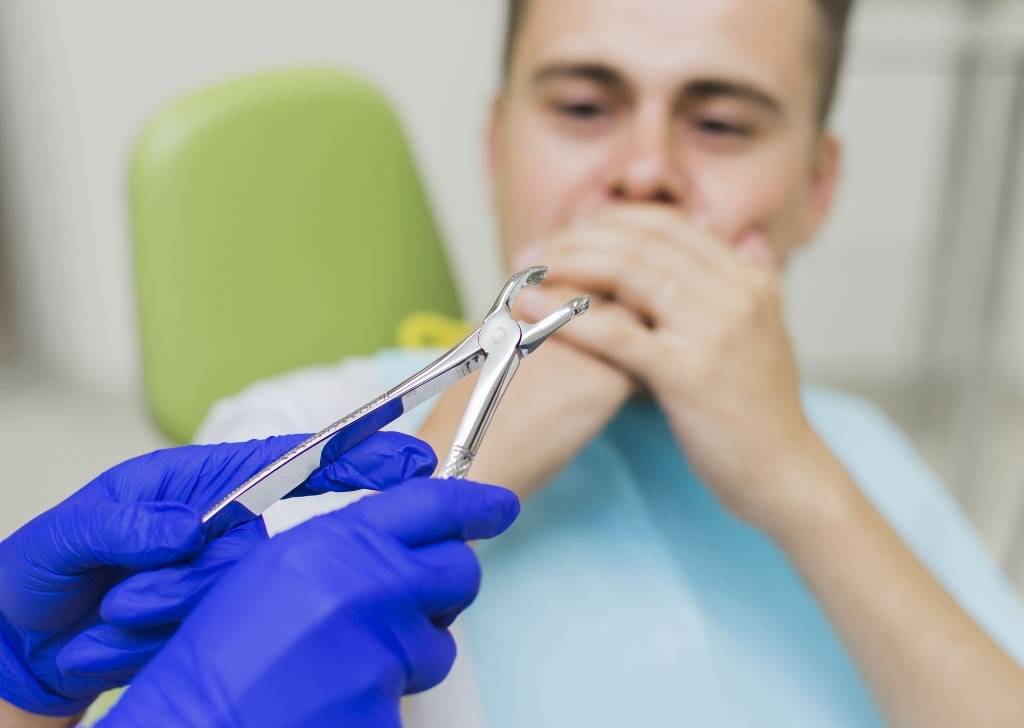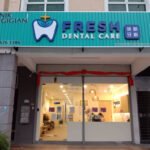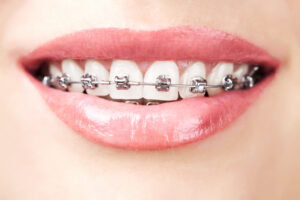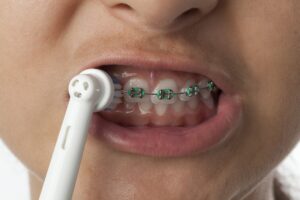If you’ve just had a tooth pulled out, you’re probably wondering — what now? Whether it was due to decay, injury, or infection, an extracted tooth leaves behind more than just a gap in your smile.
At Fresh Dental Kepong, you have three choices to choose from: dental implant for a permanent fix, a denture treatment for flexibility, or a crown and bridge solution for something in between.
Let’s walk you through what happens next — and why replacing that missing tooth isn’t just about looks.
Is It Necessary To Replace An Extracted Tooth?
Yes, and here’s why: a missing tooth isn’t just an aesthetic concern, it’s a functional one too. Many people assume that if a tooth isn’t visible or doesn’t cause immediate pain, it can be left alone. But the reality is that a missing tooth does more damage over time than you might think — even if you’re feeling fine right now.
Bone Loss and Facial Changes
When a tooth is extracted and not replaced, the bone that used to support it begins to shrink. This process is called resorption. Over time, bone loss can lead to sunken cheeks and premature facial ageing — especially if multiple teeth are missing. Implants are the only option that actively helps prevent bone loss by mimicking natural tooth roots.
Teeth Shifting and Bite Misalignment
Your teeth rely on each other for support. When one is missing, neighbouring teeth may start to drift into the empty space. This can lead to bite issues, crowding, and even jaw pain. Eventually, this shifting may require orthodontic correction — which could’ve been avoided with timely replacement.
Chewing and Speaking Difficulty
Missing teeth often force you to chew on one side of your mouth, which creates uneven wear. Depending on the tooth’s location, you might also notice difficulty with certain words or find yourself avoiding hard foods altogether.
Increased Risk of Gum Disease
Gaps can become a trap for food particles and bacteria, especially if oral hygiene is compromised. This puts you at a higher risk for gum disease, decay, and further tooth loss.
Replacing a missing tooth isn’t just cosmetic — it’s about restoring full oral function and protecting the structure of your mouth.
Your 3 Best Options After Tooth Extraction
1. Dental Implants: A Permanent Replacement
Dental implants are widely regarded as the gold standard for tooth replacement. They involve placing a titanium screw into your jawbone to act as a new tooth root. Once healed, a crown is attached to the implant for a natural-looking, fully functional tooth.
They’re especially ideal for patients who want a long-term, low-maintenance solution and are in good general and oral health. We offer dental implants in Kepong using high-quality materials and precise digital imaging.
2. Dental Bridges: Fast and Functional
A dental bridge literally “bridges the gap” created by one or more missing teeth. It consists of one or more artificial teeth anchored in place by crowns fitted over the adjacent natural teeth.
Bridges are faster to complete than implants and don’t require surgery, making them a practical option for many. However, they do require altering the neighbouring teeth, which is a trade-off for some patients.
For patients exploring this route, our crown and bridge treatment in Kepong ensures a seamless, natural look that matches your existing smile.
3. Dentures: Affordable and Removable
Dentures come in partial and full varieties and are designed to be removable. They’re often the go-to solution for patients missing multiple teeth or who are looking for a cost-effective, non-invasive replacement.
At Fresh Dental Care Kepong, our denture treatment services are fully customised to ensure optimal fit, comfort, and appearance. For patients not ready for implants, modern dentures are far more comfortable and aesthetic than they used to be.
Dental Bridge vs Implant vs Denture: Which One Is Right For You?
Choosing between a dental implant, bridge, or denture can feel overwhelming. Each comes with its own strengths and limitations depending on your situation. Whether it’s cost, healing time, comfort, or aesthetics. Let’s break it down so you can make the most informed choice.
Dental Implants: The Closest Thing to a Natural Tooth
Implants are surgically placed into the jawbone and function just like natural teeth. They’re incredibly strong, long-lasting, and preserve jawbone health by stimulating bone like a real tooth root would. This makes them the best long-term investment if you’re healthy enough for oral surgery.
However, the process requires several appointments spread across a few months. It’s also typically the most expensive option — but one that pays off in durability and aesthetics.
Dental Bridges: Quicker, Less Invasive, Still Effective
A bridge is a great option if you’re missing one or two teeth and want a faster fix. Since it doesn’t require implanting into the bone, the treatment time is shorter. However, your neighbouring teeth will need to be filed down to support the bridge, which might not be ideal for everyone.
Bridges typically last 5 to 15 years and offer a natural look, especially when paired with quality dental crowns.
Dentures: Practical and Budget-Friendly
Dentures are your go-to solution when you’ve lost several or all your teeth. They’re removable, easier on the wallet, and can be made relatively quickly.
That said, they do come with a learning curve, especially when adjusting to eating and speaking. Over time, your jawbone may shrink due to lack of stimulation, which is something implants help prevent. Still, for many, especially seniors, dentures remain a reliable and flexible option.
To Summarize:
- DENTURES
- Looks & Function
Can look natural but may feel bulky
- Procedure Time
Typically ready in a few weeks
- Invasiveness
Non-surgical, removable
- Jawbone Health
May lead to jawbone shrinkage over time
- Comfort & Fit
May need adhesives; can take time to adjust
- Cost
Most affordable
- Best For
Multiple missing teeth or full arch replacement
How Soon Can You Replace a Missing Tooth?
Healing Phase Before Implant Placement
After a tooth is extracted, your jaw needs time to heal. For most dental implants, this means waiting around 3 to 6 months. This healing time ensures that the bone regenerates enough to securely hold the implant. Skipping this step risks complications, including implant failure.
Immediate vs Delayed Implant Options
Some patients might qualify for immediate implants — placed during the same session as the extraction. However, this only works if the surrounding bone is strong and there’s no infection present. Otherwise, dentists recommend delayed placement to allow proper healing.
Bridge and Denture Fitting Timeline
Bridges usually require a healing period of 2 to 4 weeks, depending on gum health and whether neighboring teeth need reshaping. Partial or full dentures can be provided almost immediately after extraction in some cases. These are typically temporary until the mouth fully adjusts and a permanent fit is ready.
How to Care for Your New Tooth Replacement
Cleaning Routines for Each Type
Proper hygiene depends on the type of tooth replacement you choose. For dental implants, treat them like natural teeth — brush twice daily with a soft-bristled toothbrush and use floss or interdental brushes to clean around the implant crown.
Dental bridges require cleaning underneath the false tooth. Special floss threaders or water flossers can help reach tight spots between the gums and the bridge.
Dentures need to be removed and brushed gently every day. Soak them overnight in a denture solution to prevent bacteria buildup and keep them fresh.
What to Avoid During Healing
Regardless of the restoration, it’s best to avoid hard, crunchy, or sticky foods during the initial healing phase. Smoking delays recovery and increases implant failure risk. Be gentle when brushing or flossing around the site — irritation can lead to inflammation or infection.
When to Return for Dental Reviews
Follow-up appointments are crucial. We usually recommend returning one week after the procedure to check for any healing issues. After that, routine reviews every 6 months will ensure the restoration stays secure, clean, and functioning properly. Adjustments may be needed over time, especially with dentures or bridges.
FAQ
Can wisdom teeth replace missing teeth?
*In rare cases, wisdom teeth can be repositioned or used to replace a missing molar, but this typically requires complex surgical planning. Most of the time, wisdom teeth are impacted or not ideally shaped for this role. It’s not a common or predictable solution, and often implants or bridges are more effective replacements.
*This information is for educational purposes only. Fresh Dental Care Kepong does not provide this procedure as part of our services.
What is the cheapest way to replace a missing tooth?
Removable partial dentures are generally the most affordable option for replacing a missing tooth. They’re simple to fabricate, don’t require surgery, and can be adjusted or replaced easily. However, they might not offer the same stability or aesthetics as fixed solutions like bridges or implants.
Can I replace a missing tooth without an implant?
Yes. Alternatives include dental bridges, which use adjacent teeth for support, or removable dentures. The right option depends on how many teeth are missing, your oral health, and budget. Implants are ideal, but not always necessary if other options can meet your functional and aesthetic needs.
Can I replace a missing tooth at home?
No, you cannot and should not attempt to replace a missing tooth at home. DIY solutions can lead to infections, misalignment, or irreversible damage. Always consult a qualified dentist to discuss safe and medically approved extracted tooth replacement options.
Can braces replace missing teeth?
Braces don’t replace missing teeth, but they can reposition existing teeth to close small gaps. In certain cases, orthodontic treatment is used to prepare the space for an implant or bridge later on. They’re part of a full treatment plan, not a replacement method by themselves.
Book Your Tooth Replacement Consultation Today
Missing a tooth? Whether you’re considering dental implants, bridges, or dentures, our experienced dentists at Fresh Dental Care Kepong are here to guide you every step of the way. We use advanced dental technology, a patient-first approach, and affordable treatment options tailored to your needs.
Send us a WhatsApp message now to book your consultation or ask us anything.








